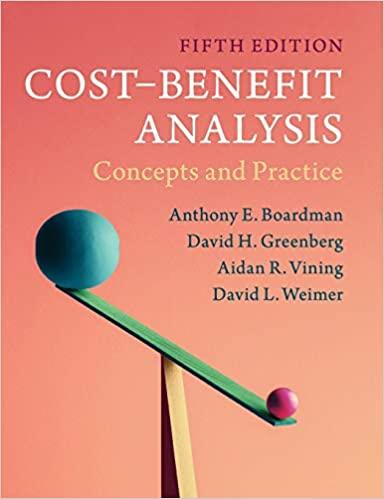Can someone please brief this case by helping me to fill in the 4 requirements?
FACTS:
ISSUE:
DECISION:
REASON:
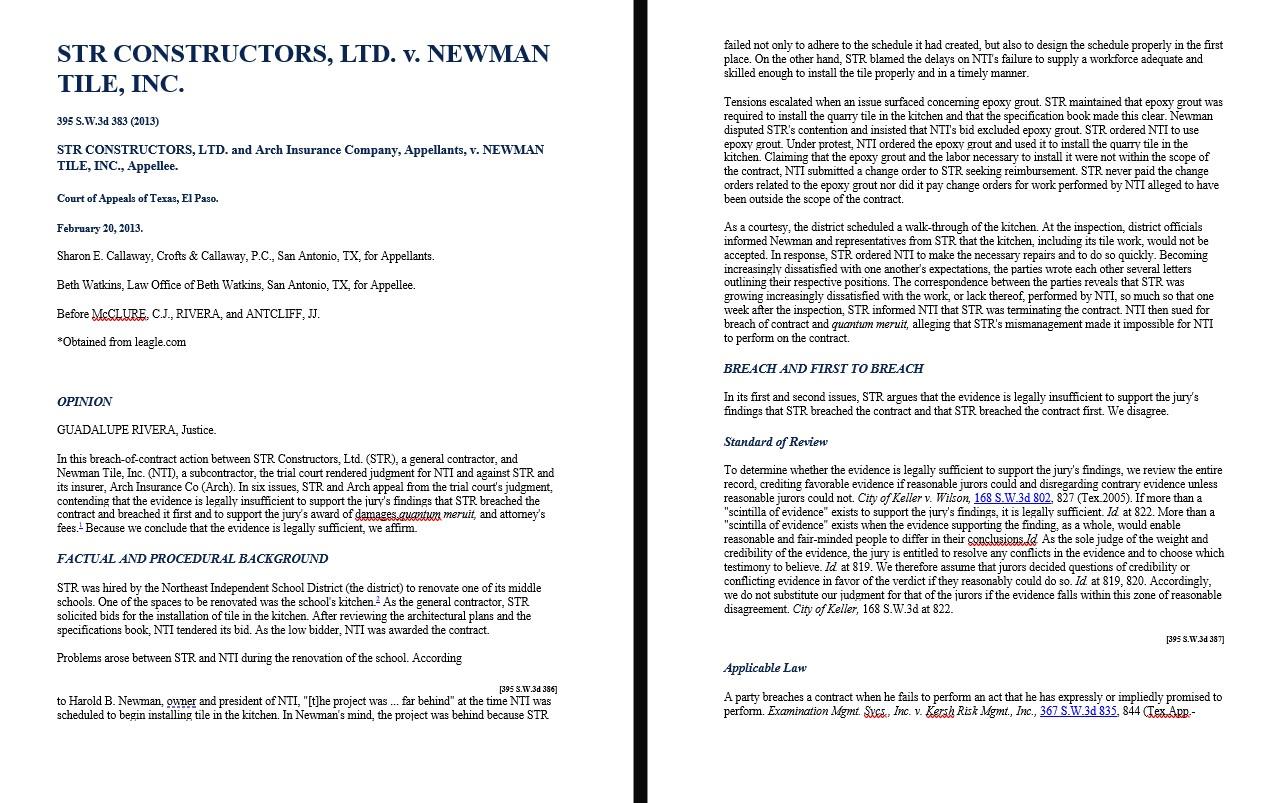
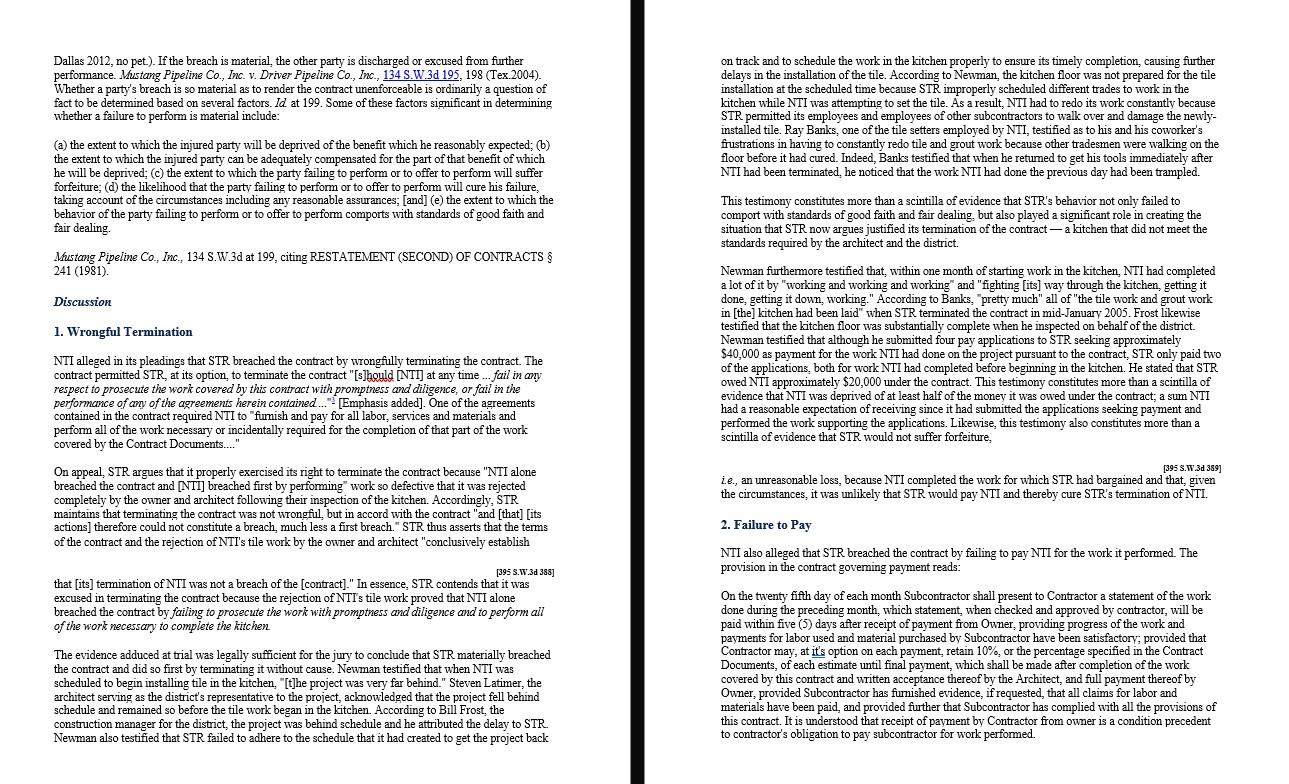
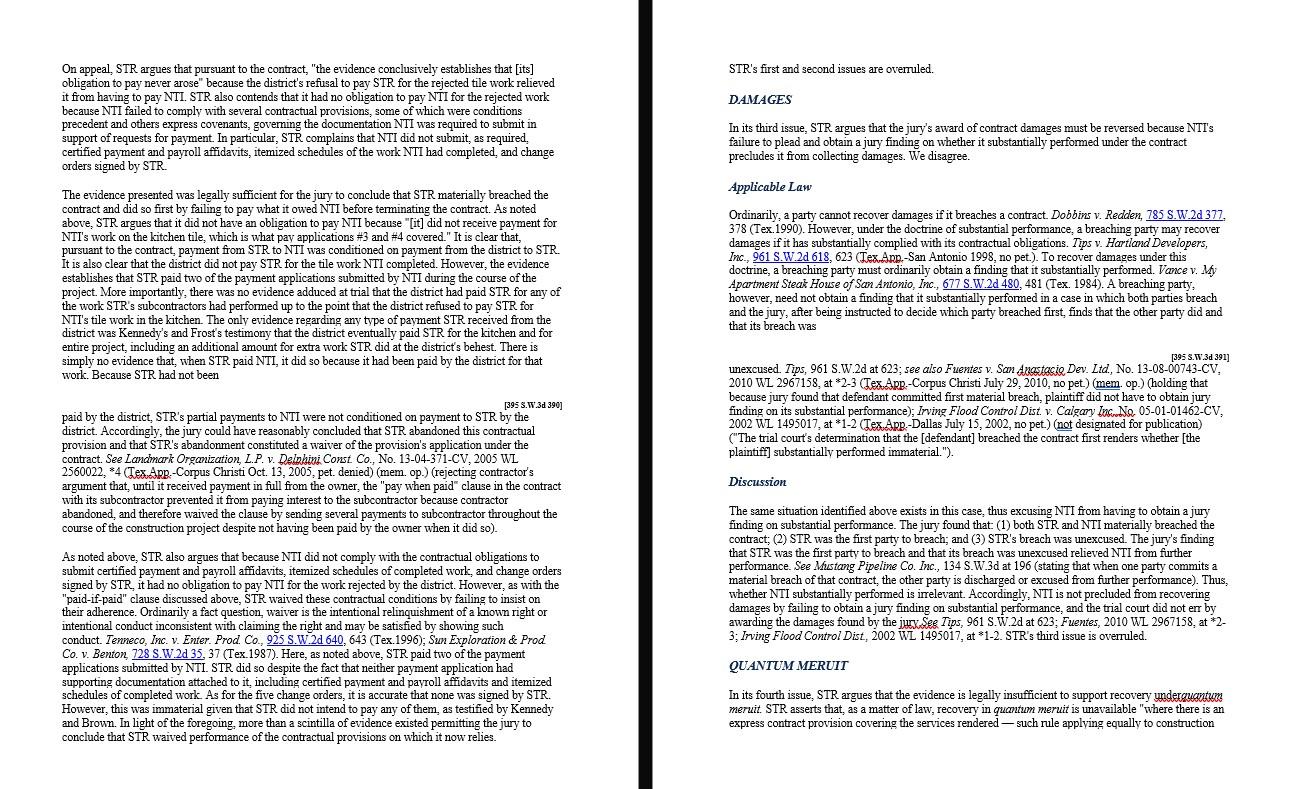
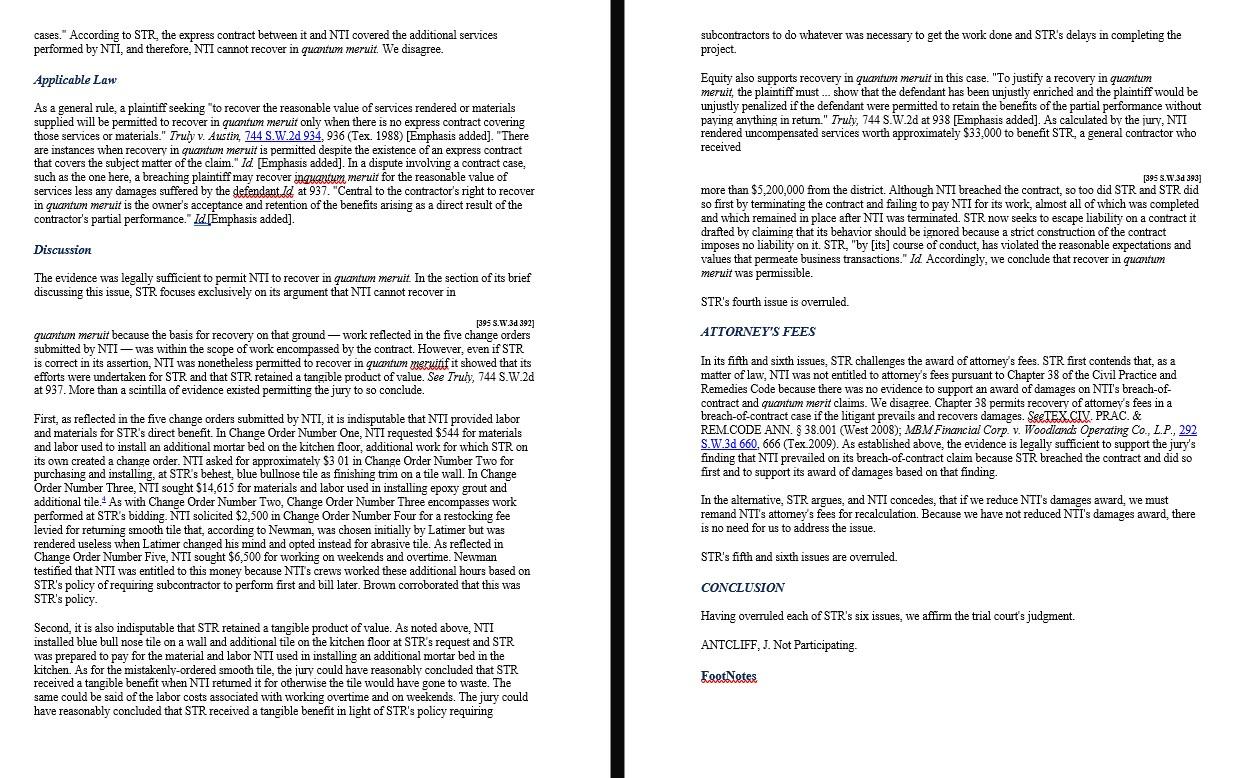
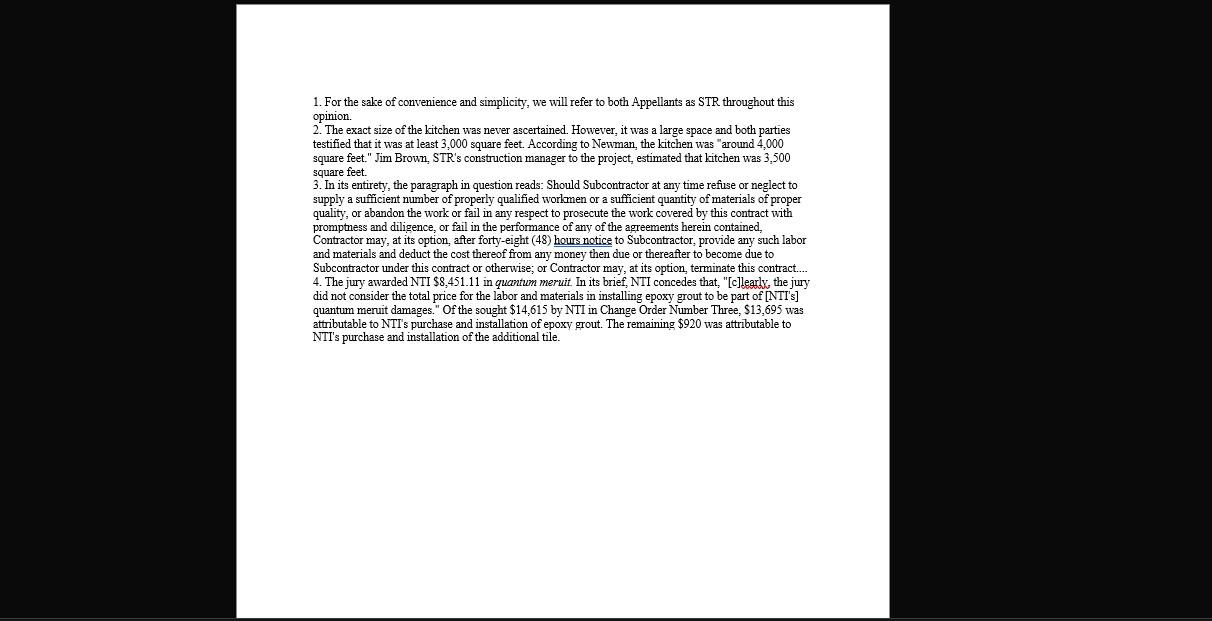
On appeal, STR argues that pursuant to the contract, "the evidence conclusively establishes that [its] obligation to pay never arose" because the district's refusal to pay STR for the rejected tile work relieved it from having to pay NTI. STR also contends that it had no obligation to pay NTI for the rejected work STR's first and second issues are overruled. because NTI failed to comply with several contractual provisions, some of which were conditions DAMAGES precedent and others express covenants, governing the documentation NTI was required to submit in In its third issue, STR argues that the jury's award of contract damages must be reversed because NTT's failure to plead and obtain a jury finding on whether it substantially performed under the contract certified payment and payroll affidavits, itemized schedules of the work NTI had completed, and change orders signed by STR. orders signed by STR. The evidence presented was legally sufficient for the jury to conclude that STR materially breached the contract and did so first by failing to pay what it owed NTI before terminating the contract. As noted above, STR argues that it did not have an obligation to pay NTI because "[it] did not receive paym NTI's work on the kitchen tile, which is what pay applications #3 and #4 covered." It is clear that, Applicable Law NTI's work on the kitchen tile, which is what pay applications #3 and #4 covered. It is clear that, Ordinarily, a party cannot recover damages if it breaches a contract. Dobbins v. Redden, 785 S.W. 2d377. 378 (Tex.1990). However, under the doctrine of substantial performance, a breaching party may recover damages if it has substantially complied with its contractual obligations. Tips v. Hortland Developers, Inc., 961S. W. 2d618,623 (Tex.App.-San Antonio 1998 , no pet.). To recover damages under this doctrine, a breaching party must ordinarily obtain a finding that it substantially performed. Vance v. My Apartment Steak House of San Antonio, Inc., 677S. W. 2d480,481 (Tex. 1984 ). A breaching party, however, need not obtain a finding that it substantially performed in a case in which both parties breach and the jury, after being instructed to decide which party breached first, finds that the other party did and that its breach was It is also clear that the district did not pay STR for the tile work NTI completed. However, the evidence establishes that STR paid two of the payment applications submitted by NTI during the course of the project. More importantly, there was no evidence adduced at trial that the district had paid STR for any of the work STR's subcontractors had performed up to the point that the district refused to pay STR for NTI's tile work in the kitchen. The only evidence regarding any type of payment STR received from the district was Kennedy's and Frost's testimony that the district eventually paid STR for the kitchen and for entire project, including an additional amount for extra work STR did at the district's behest. There is entire project, including an additional amount for extra work STR did at the district's behest. There is simply no eridence that, when STR paid NTI, it did so because it had been paid by the district for that work. Because STR had not been Co. v. Benton, 728S.W.2d 35,37 (Tex.1987). Here, as noted above, STR paid two of the payment applications submitted by NTI. STR did so despite the fact that neither payment application had supporting documentation attached to it, including certified payment and payroll affidavits and itemized schedules of completed work. As for the five change orders, it is accurate that none was signed by STR. However, this was immaterial given that STR did not intend to pay any of them, as testified by Kennedy QUANTUM MERUIT and Brown. In light of the foregoing, more than a scintilla of evidence existed permitting the jury to In its fourth issue, STR argues that the evidence is legally insufficient to support recovery underguantum conclude that STR waived performance of the contractual provisions on which it now relies. cases." According to STR, the express contract between it and NTI covered the additional services performed by NTI, and therefore, NTI cannot recover in quantum meruit. We disagree. subcontractors to do whatever was necessary to get the work done and STR's delays in completing the Applicable Law As a general rule, a plaintiff seeking "to recover the reasonable value of services rendered or materials project. supplied will be permitted to recover in quantum meruit only when there is no express contract covering Equity also supports recovery in quantum meruit in this case. "To justify a recovery in quantum those services or materials." Truly v. Austin, 744S.W.2d 934,936 (Tex. 1988) [Emphasis added]. "There unjustly penalized if the defendant were permitted to retain the benefits of the partial performance without those services or materials. "Truly v. Austin, 744S. W. 2d934 are instances when recovery in quantum meruit is permitted despite the existence of an express contract paying anything in return." Truly, 744S.W.2d at 938 [Emphasis added]. As calculated by the jury, NTI rendered uncompensated services worth approximately $33,000 to benefit STR, a general contractor who that covers the subject matter of the claim." Id. [Emphasis added]. In a dispute involving a contract case, such as the one here, a breaching plaintiff may recover inqugutum, meruit for the reasonable value of in quantum meruit is the owner's acceptance and retention of the benefits arising as a direct result of the received contractor's partial performance." Id. Emphasis added]. [395 s.w.3d 393] more than $5,200,000 from the district. Although NTI breached the contract, so too did STR and STR did so first by terminating the contract and failing to pay NTI for its work, almost all of which was completed and which remained in place after NTI was terminated. STR now seeks to escape liability on a contract it drafted by claiming that its behavior should be ignored because a strict construction of the contract imposes no liability on it. STR, "by [its] course of conduct, has violated the reasonable expectations and values that permeate business transactions." Id. Accordingly, we conclude that recover in quontum Discussion The evidence was legally sufficient to permit NTI to recover in quantwm meruit. In the section of its brief discussing this issue, STR focuses exclusively on its argument that NTI cannot recover in 1. For the sake of convenience and simplicity, we will refer to both Appellants as STR throughout this opinion. 2. The exact size of the kitchen was never ascertained. However, it was a large space and both parties testified that it was at least 3,000 square feet. According to Newman, the kitchen was "around 4,000 square feet." Jim Brown, STR's construction manager to the project, estimated that kitchen was 3,500 square feet. 3. In its entirety, the paragraph in question reads: Should Subcontractor at any time refuse or neglect to supply a sufficient number of properly qualified workmen or a sufficient quantity of materials of proper quality, or abandon the work or fail in any respect to prosecute the work covered by this contract with promptness and diligence, or fail in the performance of any of the agreements herein contained, Contractor may, at its option, after forty-eight (48) hours notice to Subcontractor, provide any such labor and materials and deduct the cost thereof from any money then due or thereafter to become due to Subcontractor under this contract or otherwise; or Contractor may, at its option, terminate this contract.... 4. The jury awarded NTI \$8,451.11 in quantum meruit. In its brief, NTI concedes that, "[c]learly, the jury did not consider the total price for the labor and materials in installing epoxy grout to be part of [NTI's] quantum meruit damages." Of the sought $14,615 by NTI in Change Order Number Three, $13,695 was attributable to NTI's purchase and installation of epoxy grout. The remaining $920 was attributable to NTI's purchase and installation of the additional tile. On appeal, STR argues that pursuant to the contract, "the evidence conclusively establishes that [its] obligation to pay never arose" because the district's refusal to pay STR for the rejected tile work relieved it from having to pay NTI. STR also contends that it had no obligation to pay NTI for the rejected work STR's first and second issues are overruled. because NTI failed to comply with several contractual provisions, some of which were conditions DAMAGES precedent and others express covenants, governing the documentation NTI was required to submit in In its third issue, STR argues that the jury's award of contract damages must be reversed because NTT's failure to plead and obtain a jury finding on whether it substantially performed under the contract certified payment and payroll affidavits, itemized schedules of the work NTI had completed, and change orders signed by STR. orders signed by STR. The evidence presented was legally sufficient for the jury to conclude that STR materially breached the contract and did so first by failing to pay what it owed NTI before terminating the contract. As noted above, STR argues that it did not have an obligation to pay NTI because "[it] did not receive paym NTI's work on the kitchen tile, which is what pay applications #3 and #4 covered." It is clear that, Applicable Law NTI's work on the kitchen tile, which is what pay applications #3 and #4 covered. It is clear that, Ordinarily, a party cannot recover damages if it breaches a contract. Dobbins v. Redden, 785 S.W. 2d377. 378 (Tex.1990). However, under the doctrine of substantial performance, a breaching party may recover damages if it has substantially complied with its contractual obligations. Tips v. Hortland Developers, Inc., 961S. W. 2d618,623 (Tex.App.-San Antonio 1998 , no pet.). To recover damages under this doctrine, a breaching party must ordinarily obtain a finding that it substantially performed. Vance v. My Apartment Steak House of San Antonio, Inc., 677S. W. 2d480,481 (Tex. 1984 ). A breaching party, however, need not obtain a finding that it substantially performed in a case in which both parties breach and the jury, after being instructed to decide which party breached first, finds that the other party did and that its breach was It is also clear that the district did not pay STR for the tile work NTI completed. However, the evidence establishes that STR paid two of the payment applications submitted by NTI during the course of the project. More importantly, there was no evidence adduced at trial that the district had paid STR for any of the work STR's subcontractors had performed up to the point that the district refused to pay STR for NTI's tile work in the kitchen. The only evidence regarding any type of payment STR received from the district was Kennedy's and Frost's testimony that the district eventually paid STR for the kitchen and for entire project, including an additional amount for extra work STR did at the district's behest. There is entire project, including an additional amount for extra work STR did at the district's behest. There is simply no eridence that, when STR paid NTI, it did so because it had been paid by the district for that work. Because STR had not been Co. v. Benton, 728S.W.2d 35,37 (Tex.1987). Here, as noted above, STR paid two of the payment applications submitted by NTI. STR did so despite the fact that neither payment application had supporting documentation attached to it, including certified payment and payroll affidavits and itemized schedules of completed work. As for the five change orders, it is accurate that none was signed by STR. However, this was immaterial given that STR did not intend to pay any of them, as testified by Kennedy QUANTUM MERUIT and Brown. In light of the foregoing, more than a scintilla of evidence existed permitting the jury to In its fourth issue, STR argues that the evidence is legally insufficient to support recovery underguantum conclude that STR waived performance of the contractual provisions on which it now relies. cases." According to STR, the express contract between it and NTI covered the additional services performed by NTI, and therefore, NTI cannot recover in quantum meruit. We disagree. subcontractors to do whatever was necessary to get the work done and STR's delays in completing the Applicable Law As a general rule, a plaintiff seeking "to recover the reasonable value of services rendered or materials project. supplied will be permitted to recover in quantum meruit only when there is no express contract covering Equity also supports recovery in quantum meruit in this case. "To justify a recovery in quantum those services or materials." Truly v. Austin, 744S.W.2d 934,936 (Tex. 1988) [Emphasis added]. "There unjustly penalized if the defendant were permitted to retain the benefits of the partial performance without those services or materials. "Truly v. Austin, 744S. W. 2d934 are instances when recovery in quantum meruit is permitted despite the existence of an express contract paying anything in return." Truly, 744S.W.2d at 938 [Emphasis added]. As calculated by the jury, NTI rendered uncompensated services worth approximately $33,000 to benefit STR, a general contractor who that covers the subject matter of the claim." Id. [Emphasis added]. In a dispute involving a contract case, such as the one here, a breaching plaintiff may recover inqugutum, meruit for the reasonable value of in quantum meruit is the owner's acceptance and retention of the benefits arising as a direct result of the received contractor's partial performance." Id. Emphasis added]. [395 s.w.3d 393] more than $5,200,000 from the district. Although NTI breached the contract, so too did STR and STR did so first by terminating the contract and failing to pay NTI for its work, almost all of which was completed and which remained in place after NTI was terminated. STR now seeks to escape liability on a contract it drafted by claiming that its behavior should be ignored because a strict construction of the contract imposes no liability on it. STR, "by [its] course of conduct, has violated the reasonable expectations and values that permeate business transactions." Id. Accordingly, we conclude that recover in quontum Discussion The evidence was legally sufficient to permit NTI to recover in quantwm meruit. In the section of its brief discussing this issue, STR focuses exclusively on its argument that NTI cannot recover in 1. For the sake of convenience and simplicity, we will refer to both Appellants as STR throughout this opinion. 2. The exact size of the kitchen was never ascertained. However, it was a large space and both parties testified that it was at least 3,000 square feet. According to Newman, the kitchen was "around 4,000 square feet." Jim Brown, STR's construction manager to the project, estimated that kitchen was 3,500 square feet. 3. In its entirety, the paragraph in question reads: Should Subcontractor at any time refuse or neglect to supply a sufficient number of properly qualified workmen or a sufficient quantity of materials of proper quality, or abandon the work or fail in any respect to prosecute the work covered by this contract with promptness and diligence, or fail in the performance of any of the agreements herein contained, Contractor may, at its option, after forty-eight (48) hours notice to Subcontractor, provide any such labor and materials and deduct the cost thereof from any money then due or thereafter to become due to Subcontractor under this contract or otherwise; or Contractor may, at its option, terminate this contract.... 4. The jury awarded NTI \$8,451.11 in quantum meruit. In its brief, NTI concedes that, "[c]learly, the jury did not consider the total price for the labor and materials in installing epoxy grout to be part of [NTI's] quantum meruit damages." Of the sought $14,615 by NTI in Change Order Number Three, $13,695 was attributable to NTI's purchase and installation of epoxy grout. The remaining $920 was attributable to NTI's purchase and installation of the additional tile











